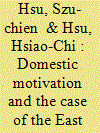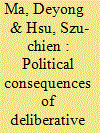| Srl | Item |
| 1 |
ID:
154652


|
|
|
|
|
| Summary/Abstract |
China's declaration of an air defense identification zone (ADIZ) in the East China Sea shocked the international community, and many explanations have been offered about the motivation behind it. We argue that domestic politics played a key role in the ADIZ policy. However, existing studies have not paid sufficient attention to decisionmakers' political motivation. To fill this gap, we explore two distinct models: the diversionary foreign policy model and the mobilization model. Both models focus on the linkage between the state leader's domestic political consideration and foreign policy behavior, but each has different theoretical and empirical implications. Our findings suggest that the mobilization model offers a better explanation of the motivation for China's move.
|
|
|
|
|
|
|
|
|
|
|
|
|
|
|
|
| 2 |
ID:
159539


|
|
|
|
|
| Summary/Abstract |
Recent research suggests that both electoral democracy and deliberative democracy under a nondemocratic regime may help to sustain existing authoritarian rule but is likely to eventually lead to the democratization of authoritarian regimes by eroding its basis in the long term. However, few studies have used comparative methods to empirically analyze the political effects of these two types of democracy together. In this article, we use survey data and in-depth interviews to empirically analyze two local political reform experiments in China. Four fieldwork sites were selected: two where democratic experiments have been implemented and two where no political reform has been implemented. We compared the political consequences of the two locations of democratic reform experimentation using indicators such as political trust, administrative performance, and democratic aspirations. The results show that the electoral democracy experiment delivered better governance and higher political legitimacy than the deliberative democracy experiment, while deliberative democracy performs better than the usual township governance system. Although the results show that the electoral democracy experiment fosters higher democratic aspiration, strong evidence verifying the causal mechanism between deliberative democracy experiment and appeals for democracy has not been found. Based on the empirical findings, we discuss the implications of the two experiments for China's politics.
|
|
|
|
|
|
|
|
|
|
|
|
|
|
|
|